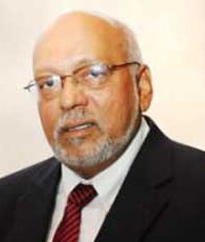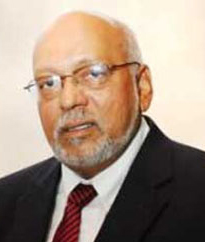President Donald Ramotar says he remains ready to work with the opposition for the country’s development, but claims his administration’s efforts have not been reciprocated by the other sides.
In his New Year’s address to the nation, which was broadcast at midnight, Ramotar declared that the last year saw “a domestically difficult political environment” despite his hope that the new configuration in the National Assembly would lead to more engagement and cooperation.

“Clearly we need more dialogue and discussions in our society. History has shown that a nation’s all round progress is always enhanced when honest debates, dialogue and compromise are the tools used in the body politic. While the government has been willing and has moved even more than halfway to meet the opposition and compromise, we have not seen that same willingness from the other sides,” the President, however, reported.
Ramotar used his address to call for the wide citizenry and more particularly the opposition to join with him in realising the common Guyanese dream of building a peaceful, modern and prosperous society. “I urge the collective opposition to reconsider its positions and recommit itself to the betterment of our country and the lives of the citizens of our Guyana. Again I wish to state that this government’s position has not changed. I am willing to work with those who are serious and interested in the socio-economic development of this our land,” he said.
Following the November 28, 2011 general elections, the Ramotar-led PPP/C won the presidency but lost control of the 65-seat National Assembly to the main opposition APNU and the AFC, which have a one-seat majority. With the failure of the parties to agree on a framework for cooperation, there has been a hostile relationship between the PPP/C-controlled executive and the opposition-controlled National Assembly, which came to a head early in the historic cuts made to the government’s national budget.
In his address, Ramotar accused the opposition of using the National Assembly as an arena to score partisan political points counter to national interests.
Unconstitutional motions, he said, are being regularly taken to the House and that government has had to resort to the courts to defend the rule of law and the constitution.
“In fact it is these same misguided positions and actions that led to some citizens being harassed and abused in Agricola and the unfortunate loss of lives in Linden,” he said, referring to protests along the East Bank public road and in the mining town of Region 10, respectively.
The Linden protest was initially organised in response to a reduction of a subsidy and resulting hike in the electricity tariffs for the town, but it escalated after three protestors were fatally shot while police tried to break up the demonstration at Mackenzie-Wismar Bridge.
Carry forward
Addressing this year, Ramotar said the government remains committed to building a Guyana that is modern and prosperous, with opportunities for every citizen to realise his/her legitimate aspirations.
But he did not announce any major new projects, explaining that the government hoped to carry forward the major projects that all have the potential to accelerate the country’s growth rate.
The government’s long-in-the-works fibre-optic cable, he said, is expected to become operational, allowing it to extend its services right across the coastland and through the interior. “It is our expectation that this will create IT jobs not only in the centre at Georgetown but from Charity to Moleson Creek and into our interior,” he explained, while adding that the initiatives will make steady advances towards a modern economy and society.
Ramotar also said that the Centre for Rehabilitation and Reintegration being built at Onverwagt, in Region 5—which Human Services Minister Jennifer Webster said would have been operational by last month—would be completed sooner rather than later in this year. “We believe that everyone in our society, no matter their background, deserve another chance at building a successful life.
After all, protecting the vulnerable is an important aspect of the humane and democratic society we are constructing,” he said.
The project is funded by the Venezuelan government with counterpart funding provided by Guyana.
He also mentioned the start of construction of the new specialty hospital, which has been mired in controversy at the pre-construction and tendering stages, saying that it will provide tertiary health care of a high standard to our citizens.
With 2013 marking the 250th anniversary of the Berbice Slave Uprising, the 175th anniversary of the arrivals of Indians in Guyana and the 175th anniversary of the abolition of slavery, Ramotar noted that the observances must be used to foster a greater understanding of ourselves and a deeper appreciation for each other.
“These anniversaries can help us promote our uniqueness as a Guyanese people and promote our Guyanese culture that has emerged and is enriched by all of our ethnicities, and the collective experiences of our people who have made this land their home,” he added.
Very well
Looking back at the last year, Ramotar said it was one of both challenges and also positive developments.
Despite “a very serious economic crisis” gripping the world, he said, Guyana performed well on the economic front. “We have managed the economy very well and have made progress in continuing to expand our economic base,” he argued, noting that a GDP growth of about 4% was expected for the year, making it the seventh straight year growth was recorded. “Our sustained strong economic performance is an impressive achievement in light of the prevailing international economic situation. It shows that although we are a small vulnerable economy, the policies we implemented have allowed our economy to be resilient to the external challenges that we face. Let me express our thanks to all our people who have labored to make this a reality,” he added. Ramotar also trumpeted progress in the social sectors and particularly education, where he noted that the country has achieved universal primary education and is on its way to achieving universal secondary education. Guy-ana’s CSEC candidates have once more captured most of the awards given by the Caribbean examination and certification board, he pointed out, while adding that more young people are accessing tertiary and university education than ever before.
“Investing in the education of our young people is important for progress in our country to continue and in this case what we see is that our investment is paying off,” he said, promising that the investment would continue as government is working to construct new schools in the interior to ensure that no matter where the nation’s children are, they have a chance at a secondary education.
Ramotar added that the same positive results could be seen in other social sectors, such as health and housing. Of the latter, he noted that the housing programme has helped to fulfill the dreams of many to own their own homes. “We will continue to seek more innovative ways to help more of our people to experience the security of having their own roof over their heads,” he added.





